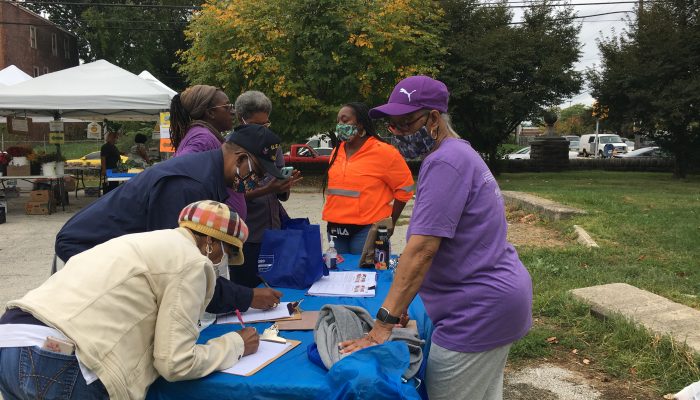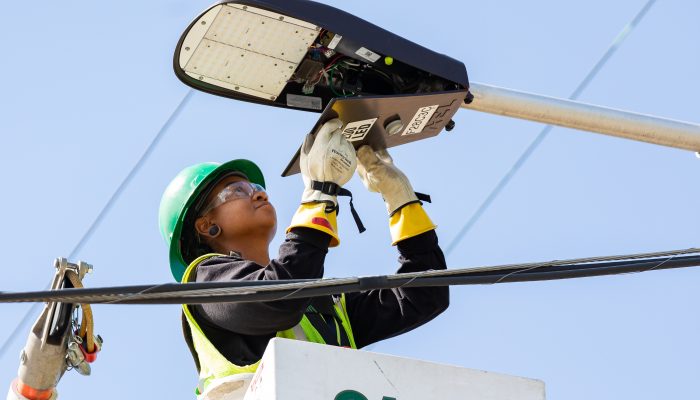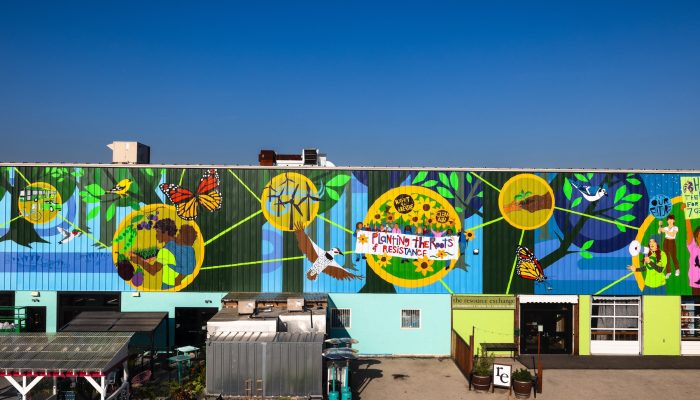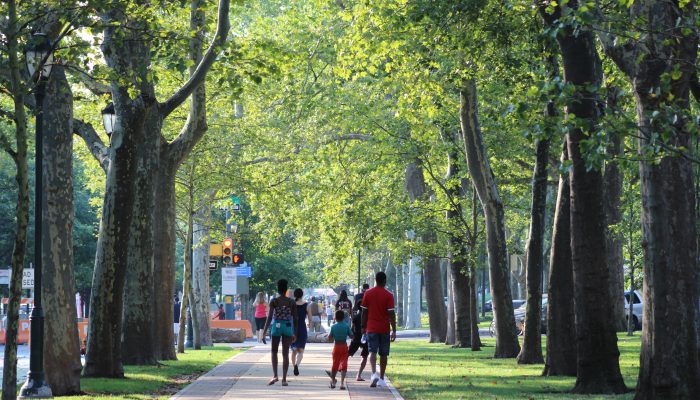In 2014, the EPA declared February to be Environmental Justice Month to commemorate the signing of historic 1994 executive order 12898: “Federal Actions to Address Environmental Justice in Minority Populations.” This year to commemorate, we’re highlighting new and ongoing environmental justice initiatives in Philadelphia and resources available to residents for addressing environmental issues in their homes and communities.
Environmental justice is a grassroots movement that first started gaining momentum in the 1980s led by Black, Indigenous, and People of Color (BIPOC) communities advocating for economic and racial justice, community self-determination, and environmental stewardship in decision-making. According to the Environmental Protection Agency, environmental justice is the fair treatment and meaningful involvement of all people regardless of race, color, national origin, or income with respect to the development, implementation, and enforcement of environmental laws, regulations, and policies. This goal will be achieved when everyone enjoys the same degree of protection from environmental and health hazards and equal access to the decision-making process to have a healthy environment in which to live, learn, and work.
In Philadelphia, the longstanding challenges of systemic racism have led to differences between neighborhoods. Black, Brown, and low-income neighborhoods are most likely to be near industrial areas and experience high rates of pollution. Those same areas are less likely to have green spaces like parks and gardens. These differences contribute to inequality in health and wellbeing.
The environmental and sustainability movements owe a great deal to frontline communities—those who live or work on the frontlines of exposure to environmental harm—who organize and continue to advocate for their right to clean land, air, and water for all. Individuals and communities throughout Philadelphia work every day toward environmental justice, whether by growing food, checking in on neighbors during heat waves, or organizing around air quality, zoning, development, or a green economy.
Environmental Justice Advisory Commission
Last month, Mayor Kenney announced the formation of the City’s first Environmental Justice Advisory Commission. The Commission will assemble individuals with lived experience of and personal interest in Philadelphia’s environmental issues. Commission members will work to identify where multiple impacts occur, as well as City policies or procedures that result in barriers to achieving environmental justice. The group will strive to amplify the concerns of frontline communities and will work with the City to co-develop plans to address disparities in exposure to environmental harm. Those interested in receiving updates on the Commission, including when recruitment opens, should fill out the Environmental Justice Advisory Commission interest form or email ejac@phila.gov.
Initiative Spotlight: Beat the Heat Hunting Park
Some Philadelphia neighborhoods can be 22 degrees warmer than others in the summertime, and this unequal exposure disproportionately affects Black and Brown communities. With climate change contributing to hotter temperatures, heat resiliency is a top priority for the City. Starting in one of Philadelphia’s hottest neighborhoods, Hunting Park, the Beat the Heat initiative works to address heat disparity by partnering with community organizations and residents to explore local experiences with heat and ways to support residents during heat waves and cool the neighborhood. Partners in Hunting Park have supported heat-relief giveaways, identified opportunities for trees and green infrastructure, expanded access to cooling resources, and created new cooling opportunities. To learn more, visit our recent Beat the Heat blog post or or contact Beat the Heat Coordinator Cheyenne Flores at Cheyenne.Flores@phila.gov.
Resources for Residents
Explore the resources below to learn how to address environmental issues in your home and community.
Air Quality
- Keep track of Philadelphia’s daily air quality and protect your health during these events. Monitoring and resources are available on the City’s air quality webpage.
- Receive an email when an Air Quality Action Day is declared by signing up to receive air quality notifications.
- Alert Air Management Services to issues such as idling, dust, or unusual odor. Call 215-685-7580 (business hours) or 215-686-4516 (all other times).
- Visit the Lead and Healthy Homes Program webpage to find what resources are available to ensure a home that is free from lead and other hazards.
Water Quality
- For any questions about lead in your water, call the Philadelphia Water Department hotline at 215-685-6300. Staff will provide information on water testing, safety tips, and replacement options.
- Make sure your plumbing and lateral, which connects your house to the water main, are in good, safe condition to ensure drinking water quality. The Homeowner’s Emergency Loan Program (HELP) can help homeowners afford repairs to water and sewer service pipes.
Flooding and Storms
- Sign up for ReadyPhiladelphia, the region’s emergency text and email alert system. The alerts are free, but standard text messaging rates may apply.
- Take part in the Philadelphia Water Department’s Basement Protection Program to protect your basement from flooding.
- Learn more about residential stormwater tools and what you can do to beautify your home and help our streams on the Philadelphia Water Department’s Raincheck Program website.
- Visit the City’s flood preparedness webpage for more information on available resources.
- Use the Resilient Community Worksheet to plan for how to respond to a storm or other emergency event.
Extreme Temperatures
- For extreme heat days, find your local cooling center with the City’s cooling center map resource.
- Find ways to prepare your community for hotter summers with the Community Heat Relief Toolkit.
- The Low Income Home Energy Assistance Program (LIHEAP) can help you pay your home heating bill, whether you own or rent your home. Call 215-560-1583 to get an application.
- Call PECO CARES at 1-800-774-7040 to find out if you qualify for assistance with your electricity bill.
- For help paying with energy bills, visit a Neighborhood Energy Center. Find a list of centers on the City’s Housing & Community Development webpage.
Waste, Litter, and Illegal Dumping
- Report illegal dumping and unlicensed construction to Philly311 by calling 3-1-1 or visiting phila.gov/311.
- Learn about the City’s Vacant Lot Program on the City’s Vacant Lot Program webpage.
- Help keep your neighborhood clean by organizing and electing a block captain. Learn more on the Philadelphia More Beautiful Committee webpage.
- Use the City’s Sanitation Convenience Centers to drop off items such as tires, appliances, e-waste, mattresses, or yard waste. Visit the Streets Department’s website for more information.
- Search the City’s Litter Index to learn about local litter conditions and find resources for cleaning and beautifying your neighborhood.
Green Space
- Visit the Grounded in Philly website to find resources on identifying suitable land and working with your community to build a garden.
- Read Growing Safely in Philadelphia, produced by the Food Policy Advisory Council, to learn how to grow safely in Philadelphia’s urban soil.
- Visit TreePhilly.org to request a free yard or street tree and learn about the City’s first ever urban forest strategic planning process.
Zoning and Development
- Connect with your Registered Community Organization (RCO) to stay informed of proposed developments in your neighborhood.
- Attend a Zoning Board of Adjustment hearing to comment on any appeals decisions.
- Participate in the Citizens Planning Institute to learn more about land use decision-making.




